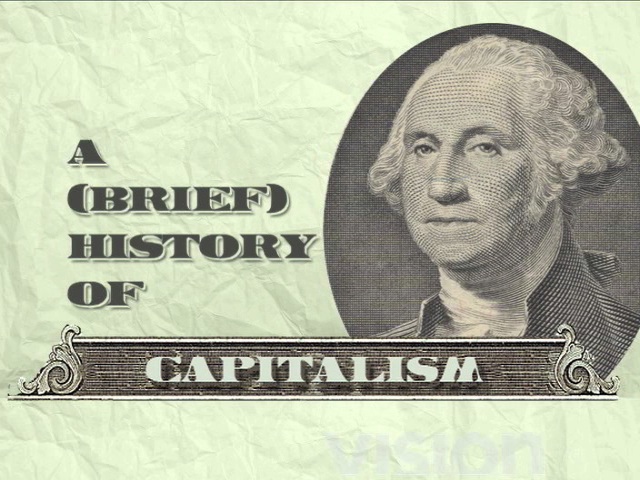Survey: Plurality of Americans Believe Capitalism At Odds With Christian Values
By Shannon Craig Straw | Apr 21, 2011

More than six-in-ten say increasing wealth inequality one of biggest problems in U.S. Overall more Americans believe that Christian values are at odds with capitalism and the free market than believe they are compatible (44% vs. 36% respectively), a new national survey finds. This pattern also holds among Christians. Among Christians in the U.S., 46% believe capitalism and the free market are at odds with Christian values, while only 38% believe the two are compatible.
The new PRRI/RNS Religion News Survey, conducted by Public Religion Research Institute in partnership with Religion News Service, also finds a strong majority (62%) saying that one of the biggest problems in the country is that more and more of the wealth is held by just a few people, compared to less than one-in-four (24%) who say this is not really a big problem.
“Religious Americans across the spectrum are strongly concerned about increasing wealth inequality in America,” said Dr. Robert P. Jones, CEO of Public Religion Research Institute. “And in the current economic climate, more religious Americans than not see some conflict between Christian values and capitalism.”
The new survey also finds that there is some disagreement among religious groups about what issues are most important for religious leaders to address.
“White evangelical Protestants are more likely than Catholics or white mainline Protestants to say that it is very important for clergy to speak out on the issue of abortion,” said Daniel Cox, PRRI research director. “On the other hand, Catholics are more likely to think it’s very important for priests to speak out about the gap between the rich and the poor than about the issue of homosexuality.”
Among the Findings
Overall more Americans believe that Christian values are at odds with capitalism and the free market than believe they are compatible (44% vs. 36% respectively). Among Christians in the U.S., only 38% believe capitalism and the free market are consistent with Christian values while 46% believe the two are at odds. A majority (53%) of Democrats believe that capitalism and Christian values are at odds compared to 26% who believe they are compatible. Among Republicans, only 37% say Christian values and capitalism are at odds, and nearly half (46%) say the two are compatible. Among Americans who identify with the Tea Party, a solid majority (56%) say that capitalism is consistent with Christian values; only 35% believe they are at odds.
More than 6-in-10 (62%) Americans believe that one of the biggest problems in this country is that more and more wealth is held by just a few people. There is broad agreement among religious groups. Three-quarters of Democrats and a plurality (47%) of Republicans say that one of the biggest problems in the country is that more and more of the wealth is held by just a few people. Americans identifying with the Tea Party are evenly divided on the question of increasing wealth inequality (41% not that big a problem, 40% one of the biggest problems).
Nearly two-thirds (66%) say that it’s fair for wealthier Americans to pay more taxes than the middle class or those less well off. There is agreement across party lines, with 58% of Republicans and 75% of Democrats agreeing. Those identifying with the Tea Party movement are evenly divided on this question (49% agree, 50% disagree). Strong majorities of all religious groups except white evangelical Protestants also say it’s fair for wealthier Americans to pay more. White evangelical Protestants are evenly divided on this question (50% agree, 49% disagree).
Overall most (61%) Americans disagree that most businesses would act ethically on their own without regulation from the government. Less than 4-in-10 (37%) believe that they would. This holds true across political and religious lines, with the lone exception of those who identify with the Tea Party movement (53% agree).
Generally, Americans across the religious landscape agree clergy should be speaking out on social issues, but are more divided about economic issues. Minority Christians stand out as one group that says it is important for clergy to speak out about a range of economic issues in addition to social issues. More religious groups say it is important for clergy to address the gap between the rich and the poor than other economic issues. Sixty-one percent of minority Christians, 61% of Catholics and 51% of white evangelical Protestants say this is an important issue for clergy to address. Among those identifying with the Tea Party, more say it is important for clergy to address social issues like abortion (61% very important) than economic issues like reducing the deficit (37% very important).
To read the full results and questionnaire, click here: http://bit.ly/AprilPRRIRNS
To read the Religion News Service story on this survey, click here: http://bit.ly/e8feZm
Results from the survey were based on telephone interviews conducted April 14–17, 2011 among a national probability sample of 1,010 adults age 18 and older. The overall margin of error is +/- 3.0.
Public Religion Research Institute is a non-profit, nonpartisan research and education organization specializing in work at the intersection of religion, values and public life.















